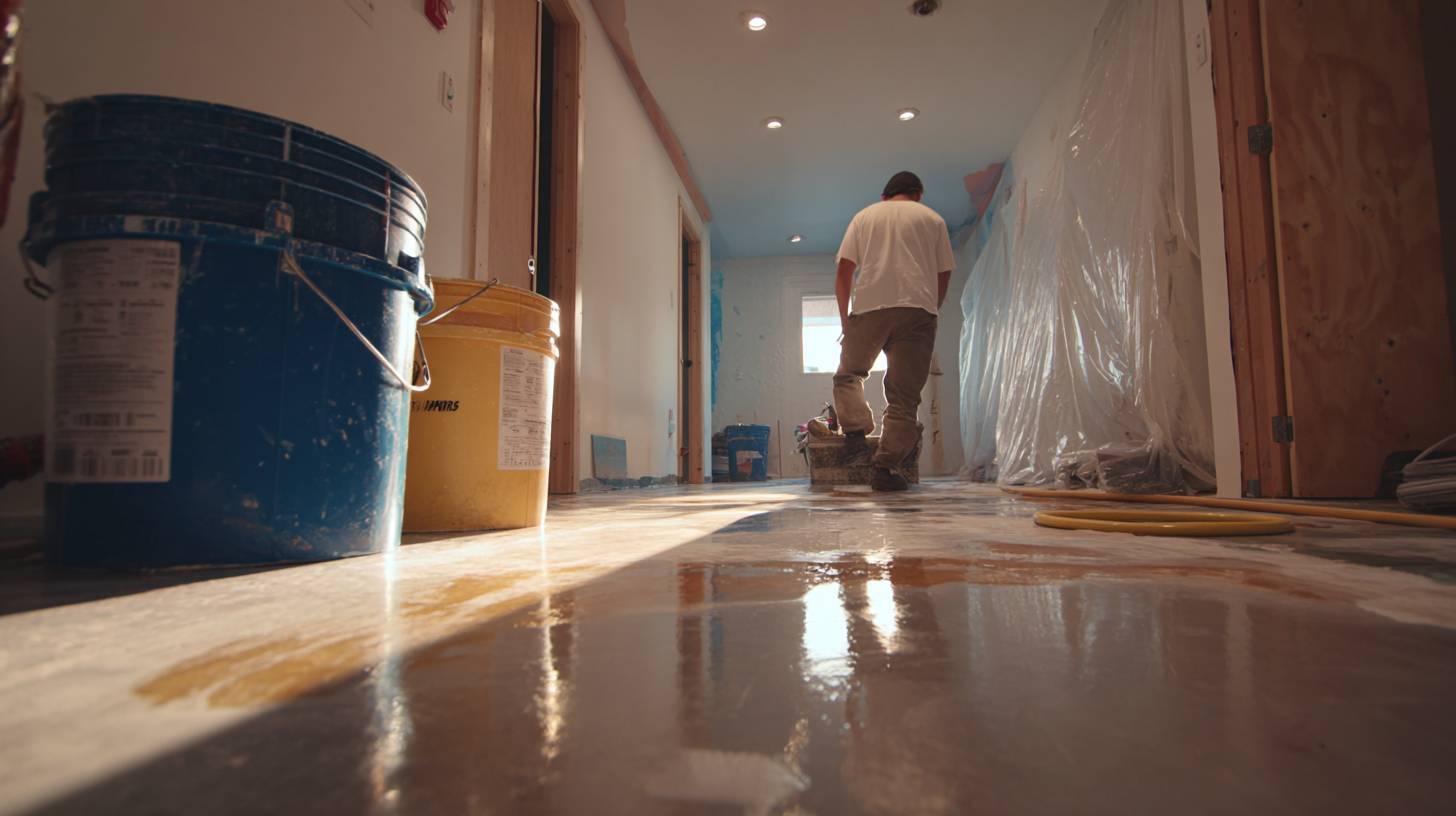Table of Contents [hide]
Choosing a basement flooring contractor? Basements aren’t like upstairs rooms—they sit below grade, face water vapor, and stay cooler. This simple guide explains moisture control, smart flooring options, and proven installation steps, so you can compare bids, avoid mold growth, and get a basement floor that looks good and lasts.
The Unique Challenges of Basement Flooring
Understanding Basement Moisture Concerns
Basements press against soil, so water vapor and liquid water are always in play. A good basement flooring contractor will review past seepage, hydrostatic pressure, and plumbing details (floor drain, sewer lines, sump pit/sump pump) before suggesting fixes like a vapor retarder or drainage.
Navigating Temperature and Humidity Fluctuations in Basements
Cool concrete and seasonal humidity can create condensation under finished flooring. Pros design for moisture resistance with waterproof underlayments, breathable assemblies, and dehumidification.
Addressing Uneven Concrete Slabs and the Need for Specialized Subfloor Preparation
Most basements need surface correction to meet flatness specs. Expect diamond grinding machinery, patching, and self-leveling compounds to create a stable base, plus clear adhesive/click-lock instructions.
Why Basement Flooring Demands Different Expertise Than General Home Flooring
Below-grade work blends building-envelope science with flooring craftsmanship. The right team knows when to use rigid foam insulation, interlocking tiles, or coatings over concrete floors, and how to sequence moisture testing, membranes, and installation.
Why You Need a Specialized Basement Flooring Contractor
Expertise in Basement-Specific Conditions
True basement flooring contractors start with building-science checks: signs of seepage, hydrostatic pressure, and how water moves through cracks, drains, and the sump pit/sump pump. They only recommend coatings or finishes after verifying moisture control and drainage.
Guiding You Through Optimal Material Selection
Specialists match flooring options to your slab’s moisture profile (verified by ASTM F2170 RH testing), headroom limits, and use case (playroom, small gym, media room, light commercial flooring corner). They’ll align membranes and underlayments to recognized standards.
Professional Installation for Lasting Performance
From interlocking subfloor tiles to coatings with tight cure windows, pro crews handle slab prep (grinding, patching, self-leveling compounds) and document tests and materials for warranty files.
Key Factors a Contractor Considers for Your Basement Floor
- Assessing Your Basement’s Moisture Profile: History of water seepage, prior sewer back up, or bell housings at floor drains; surface tests and calcium chloride or RH data as needed.
- Understanding the Functionality and Intended Use: Home gym, office, guest suite, or storage all drive choices (impact, acoustics, cleanability).
- Integrating Desired Aesthetics and Design: Wood-look vinyl plank, wood planks like engineered hardwood, or sleek polished concrete, plus stain color, finishing techniques, and transitions.
- Balancing Budget and Long-Term Value (Cost Factors): Material price, prep scope, moisture control, and warranties determine total cost. Smart sequencing can avoid a premature basement floor replacement.
Top Basement Flooring Options Recommended by Professionals
Waterproof Vinyl Flooring (Vinyl Plank, LVP/LVT)
- Why Pros Like It: High moisture resistance, wide styles, and works over flat slabs.
- Costs (depending on installation & labor): $4.50–$9.50/sf installed
- Watchouts: Needs good prep; poor slabs will telegraph. Consider waterproof vinyl with an integrated pad.
Epoxy and Polyaspartic Coatings
- Why Pros Like It: Bonds to basement concrete for a seamless, cleanable surface; polyaspartic flooring cures fast.
- Costs (depending on installation & labor): $6.00 to $12.00/sf installed
- Watchouts: Successful outcomes require meticulous grind, repair, and a sound slab. Not ideal overactive moisture unless mitigated.
Ceramic Tile and Porcelain Tile
- Why Pros Like It: Excellent for wet zones; countless looks.
- Costs (depending on installation & labor): $10.00 to $18.00/sf installed
- Watchouts: Cold underfoot without insulation; requires flatness and quality tile work.
Engineered Wood Flooring
- Why Pros Like It: Real-wood veneer with better stability than solid wood below grade.
- Costs (depending on installation & labor): $6.00 to $12.00/sf installed
- Watchouts: Not for wet basements; pair with a vapor barrier and verify the product is approved for below-grade.
Polished and Stained Concrete Floors
- Why Pros Like It: Durable, modern; stained concrete floors resist spills with a urethane coat.
- Costs (depending on installation & labor): $4.00 to $10.00/sf installed
- Watchouts: Shows slab imperfections; comfort rugs recommended.
Carpet Tiles
- Why Pros Like It: Warmth, acoustic control, easy spot replacement; options include carpeted tiles, vinyl-faced tiles.
- Costs (depending on installation & labor): $3.50 to $6.50/sf installed
- Watchouts: Choose moisture-tolerant backings; avoid in basements with ongoing leaks.
Material and labor costs according to the Bureau of Labor Statistics Producer Price Index.
How to Choose the Best Basement Flooring Contractor
Use this checklist before you sign:
- Basement Credentials: Ask about recent below-grade jobs, moisture diagnostics, and mitigation experience (vapor barriers, drain tile, sump pump integration).
- Scope Clarity: Written plan for subfloor preparation, flatness targets, self leveling compounds, and any vapor barrier or waterproof base layers.
- Material Fit: Product approvals for below-grade (e.g., engineered wood flooring, waterproof laminate flooring, epoxy coating); realistic headroom after underlayment.
- Moisture Plan: What happens if tests fail? Do they coordinate mitigation (e.g., Foundation Wall Seepage System) or reschedule after fixes?
- Quality Controls: Surface profiling, adhesive specs, cure times, and post-install monitoring.
- Protection & Cleanliness: Containment, HEPA vacs, and dust control (dustfree refinishing where relevant).
- Insurance & Reputation: Current general liability and workers’ compensation insurance; transparent reviews and Better Business Bureau standing.
- Warranty & Care: Clear labor and product warranties, maintenance guide, and quick service if issues arise.
- Communication: One project lead, daily updates, and effective communication from onsite visit to punch-list.
- Local Network: Access to mitigation partners and specialty vendors (e.g., Total Basement Finishing, Garage Kings, or local flooring store supply lines) when needed.
Choose Your Basement Flooring Contractor With Confidence
The right specialist will diagnose moisture, prep the slab correctly, and match materials to how you use the space. Compare written scopes, moisture plans, and warranties side by side, then hire for proven craft and clear communication. With the best basement flooring contractors, your new floor will look great and last.
Mr. Remodel connects you with licensed, insured contractors who handle moisture testing, subfloor prep, and clean installs. Share a few project details and get multiple bids with timelines, pricing, and warranty terms, so you can choose the basement flooring contractors that fit your budget and vision.





